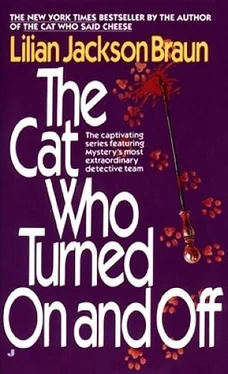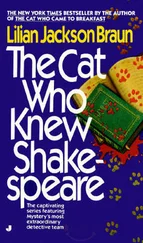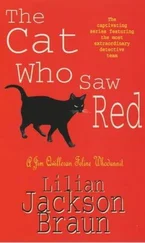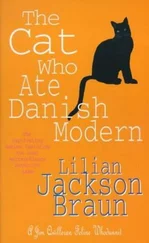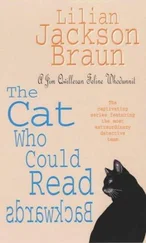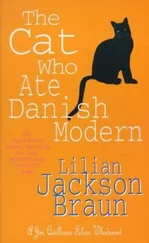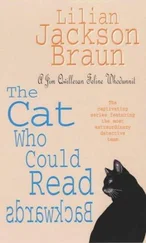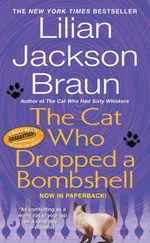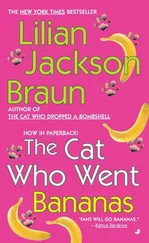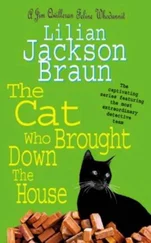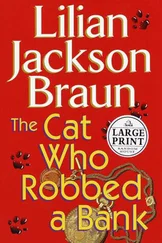Lilian Braun - The Cat Who Turned On and Off
Здесь есть возможность читать онлайн «Lilian Braun - The Cat Who Turned On and Off» весь текст электронной книги совершенно бесплатно (целиком полную версию без сокращений). В некоторых случаях можно слушать аудио, скачать через торрент в формате fb2 и присутствует краткое содержание. Жанр: Классический детектив, на английском языке. Описание произведения, (предисловие) а так же отзывы посетителей доступны на портале библиотеки ЛибКат.
- Название:The Cat Who Turned On and Off
- Автор:
- Жанр:
- Год:неизвестен
- ISBN:нет данных
- Рейтинг книги:5 / 5. Голосов: 1
-
Избранное:Добавить в избранное
- Отзывы:
-
Ваша оценка:
- 100
- 1
- 2
- 3
- 4
- 5
The Cat Who Turned On and Off: краткое содержание, описание и аннотация
Предлагаем к чтению аннотацию, описание, краткое содержание или предисловие (зависит от того, что написал сам автор книги «The Cat Who Turned On and Off»). Если вы не нашли необходимую информацию о книге — напишите в комментариях, мы постараемся отыскать её.
The Cat Who Turned On and Off — читать онлайн бесплатно полную книгу (весь текст) целиком
Ниже представлен текст книги, разбитый по страницам. Система сохранения места последней прочитанной страницы, позволяет с удобством читать онлайн бесплатно книгу «The Cat Who Turned On and Off», без необходимости каждый раз заново искать на чём Вы остановились. Поставьте закладку, и сможете в любой момент перейти на страницу, на которой закончили чтение.
Интервал:
Закладка:
The girl explained, "My family disapproves of this neighborhood, and they insist I keep Hepplewhite for protection.
Sometimes he takes his job too seriously." "There seems to be a sharp division of opinion about Junktown," said Qwilleran. "Is it really a bad neighborhood?" "We have no trouble," Miss Duckworth said. "Of course, I observe certain precautions, as any woman should if she lives alone." She brought a silver coffeepot on a silver tray, and Qwilleran watched her silky movements with admiration. She had the long-legged grace he admired in Koko and Yum Yum. What a sensation she would make at the Press Club on Christmas Eve! he told himself. She was wearing slim, well-fitted trousers in a delectable shade of blue, and a cashmere sweater dyed to match, probably at great expense.
"Have you ever done any fashion modeling?" he asked.
"No." She smiled patiently, as if she had been asked a thousand times before. "But I did a great deal of Modern Dance at Bennington." She poured one cup of coffee. Then, to Qwilleran's surprise, she reached for a crystal decanter with a silver label and poured Scotch for herself.
He said, "Well, I rented Mrs. Cobb's apartment this afternoon and moved in immediately — with my two room — mates, a pair of Siamese cats." "Really? You hardly look like a man who would keep cats." Qwilleran eyed her defensively. "They were orphans. I adopted them — first the male and then, some months later, the female." "I'd like to have a cat," she said. "Cats seem to go with antiques. They're so gentle." "You don't know Siamese! When they start flying around, you think you've been hit by a Caribbean hurricane." "Now that you have an apartment, you ought to buy the Mackintosh coat of arms. It would be perfect over your fireplace. Would you like to take it home on approval?" "It's rather heavy to be lugging back and forth. In fact," Qwilleran said, "I was surprised to see you handle it with so much ease this morning." "I'm strong. In this business you have to be strong." "What do you do for recreation? Lift weights?" She gave a small laugh. "I read about antiques, attend antiques lectures, and go to exhibits at the historical museum." "You've got it bad, haven't you?" She looked at him engagingly. "There's something mystic about antiques. It's more than intrinsic value or beauty or age. An object that has been owned and cherished by other human beings for centuries develops a personality of its own that reaches out to you. It's like an old friend. Do you understand? I wish I could make people understand." "You explain it very well, Miss Duckworth." "Mary," she said.
"Mary, then. But if you feel so strongly about antiques, why don't you want to share your interest with our readers?
Why don't you let me quote you?" She hesitated. "I'll tell you why," she said suddenly. "It's because of my family. They don't approve of what I'm doing, living on Zwinger Street and peddling — junk!" "What's their objection?" "Father is a banker, and bankers are rather stuffy. He's also English. The combination is deadly. He subsidizes my business venture on condition that I don't embarrass the family. That's why I must decline any publicity." She refilled Qwilleran's coffee cup and poured herself another Scotch.
In a teasing tone he said, "Do you always serve your guests coffee while you drink pedigreed Scotch?" "Only when they are total abstainers," she replied with a smug smile.
"How did you know I'm on the wagon?" She buried her nose in her glass for a few seconds. "Because I called my father this afternoon and had him check your credentials. I found out that you've been a crime reporter in New York, Los Angeles, and elsewhere, and that you once wrote an important book on urban crime, and that you've won any number of national journalism awards." She folded her arms and looked triumphant.
Warily Qwilleran said, "What else did you find out?" "That you had some lean years as a result of an unhappy marriage and a case of alcoholism, but you made a successful recovery, and the Daily Fluxion employed you last February, and you have been doing splendidly ever since." Qwilleran flushed. He was used to prying into the lives of others; it was disconcerting to have his own secrets exposed. "I should be flattered that you're interested," he said with chagrin. "Who is your father? What's his bank?" The girl was enjoying her moment of oneupmanship. She was also enjoying her drink. She slid down in her chair and crossed her long legs. "Can I trust you?" "Like a tombstone." "He's Percival Duxbury. Midwest National." "Duxbury! Then Duckworth isn't your real name?" "It's a name I've taken for professional purposes." Qwilleran's hopes for Christmas Eve soared; a Duxbury would make an impressive date at the Press Club. They immediately crashed; a Duxbury would probably never accept the invitation.
"A Duxbury in Junktown!" he said softly. "That would really make headlines." "You promised," she reminded him, snapping out of her casual pose.
"I'll keep my promise, " he said. "But tell me: why are you doing business on Zwinger Street? A nice shop like this belongs downtown — or in Lost Lake Hills." "I fell in love," she said with a helpless gesture. "I fell in love with these wonderful old houses. They have so much character and such potential for restoration. At first I was attracted to the idea of a proud old neighborhood resisting modernization, but after I had been here for a few months, I fell in love with the people." "The antique dealers?" "Not exactly. The dealers are dedicated and plucky, and I admire them — with certain reservations — but I'm talking about the people on the street. My heart goes out to them — the working class, the old people, the lonely ones, foreigners, illiterates, even the shady characters. Are you shocked?" "No. Surprised. Pleasantly surprised. I think I know what you mean. They're earthy; they get to you." "They're genuine, and they're unabashed individualists. They have made my former life seem so superficial and useless. I wish I could do something for the neighborhood, but I don't know what it would be. I have no money of my own, and Father made me promise not to mix." Qwilleran regarded her with a wishful wonder that she misinterpreted.
"Are you hungry?" she asked. "I think I'll find us something to eat." When she returned with crackers and caviar and smoked salmon, he said, "You were going to tell me about Andy Glanz. What kind of man was he? How did the junkers feel about him?" The Scotch had relaxed her. She put her head back, gazed at the ceiling and collected her thoughts, her posture and trousered legs jarringly out of tune with the prim eighteenth century room." "Andy did a great deal for Junktown," she began, "because of his scholarly approach to antiques. He gave talks to women's clubs. He convinced the museum curators and the serious collectors to venture into Zwinger Street." "Could I call him the major-domo of Junktown?" "I'd avoid saying that, if I were you. C. C. Cobb considers himself the neighborhood leader. He opened the first shop and promoted the idea of Junktown." "How would you describe Andy as to character?" "Honest — scrupulously honest! Most of us have a little larceny in our hearts, but not Andy! And he had a great sense of responsibility. I saw him make a citizen's arrest one night. We were driving past an abandoned house in the reclamation area, and we saw a light inside. Andy went in and caught a man stripping the plumbing fixtures." "That's illegal, I assume." "Condemned houses are city property. Yes, it's technically illegal. Anyone else would have looked the other way, but Andy was never afraid to get involved." Qwilleran shifted his position on the stiff sofa. "Did the other dealers share your admiration for Andy's integrity?" "Yes-s-s… and no," Mary said. "There's always jealousy among dealers, even though they appear to be the best of friends." "Did Andy have any other friends I could interview?" "There's Mrs. McGuffey. She's a retired schoolteacher, and Andy helped her start her antique shop. He was magnanimous in many ways." "Where would I find the lady?" "At The Piggin, Noggin and Firkin in the next block." "Old Andy get along with Cobb?" She drew a deep breath. "Andy was a diplomat. He knew how to handle C.C." "Mrs. Cobb was evidently very fond of Andy." "All women adored him. Men were not so enthusiastic, perhaps. It usually happens that way, doesn't it?" "How about Ben Nicholas? Did they hit it off?" "Their relations were amicable, although Andy thought Ben spent too much time at The Lion's Tail." "Is Ben a heavy drinker?" "He likes his brandy, but he never gets out of line. He used to bean actor. Every city has one antique dealer who used to be on the stage and one who makes it a point to be obnoxious." "What do you know about the blond fellow on crutches?" "Russell Patch used to work for Andy, and they were great friends. Then suddenly they parted company, and Russ opened his own shop. I'm not sure what caused the rift." "But you were Andy's closest friend?" Qwilleran asked with a searching look.
Читать дальшеИнтервал:
Закладка:
Похожие книги на «The Cat Who Turned On and Off»
Представляем Вашему вниманию похожие книги на «The Cat Who Turned On and Off» списком для выбора. Мы отобрали схожую по названию и смыслу литературу в надежде предоставить читателям больше вариантов отыскать новые, интересные, ещё непрочитанные произведения.
Обсуждение, отзывы о книге «The Cat Who Turned On and Off» и просто собственные мнения читателей. Оставьте ваши комментарии, напишите, что Вы думаете о произведении, его смысле или главных героях. Укажите что конкретно понравилось, а что нет, и почему Вы так считаете.
